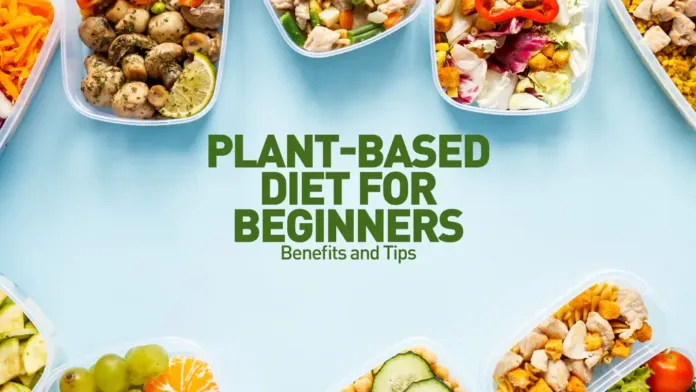In a world increasingly focused on health, sustainability, and longevity, the whole-foods, plant-based diet has emerged as a lifestyle game-changer. Backed by science and loved by health experts, this way of eating promises not only weight management and disease prevention, but also a deeper connection with what we put on our plates. Whether you’re a complete novice or just plant-curious, this guide is your go-to introduction to transforming your diet—and your life—with the power of a plant based diet.
🌿 What Is a Whole-Foods, Plant-Based Diet?
A whole-foods, plant based diet is exactly what it sounds like. It emphasizes:
-
Whole foods – minimally processed vegetables, fruits, whole grains, legumes, nuts, and seeds.
-
Plant-based – food that comes primarily or entirely from plants.
-
No animal products – While not always strictly vegan, most followers of a plant based diet avoid or greatly reduce meat, dairy, and eggs.
-
No ultra-processed junk – like sugary drinks, processed meats, and fast food.
This isn’t a restrictive fad. A plant-based diet is about abundance, variety, and whole nourishment from nature’s original offerings.
🌱 The Benefits of a Plant-Based Diet
Choosing a plant based diet is not just a wellness trend—it’s a science-backed strategy to thrive. Here are some top benefits:
1. Heart Health
A plant based diet has been proven to reduce blood pressure, cholesterol levels, and risk of heart disease.
2. Sustainable Weight Loss
Because plant foods are naturally low in calories and high in fiber, a plant based diet helps you feel full and satisfied without overeating.
3. Diabetes Prevention
Whole, fiber-rich foods help regulate blood sugar and prevent insulin resistance—a core benefit of a plant based diet.
4. Better Digestion
A healthy gut thrives on fiber, and no eating plan delivers more fiber than a plant based diet.
5. Natural Anti-Inflammation
Loaded with antioxidants and phytonutrients, a plant based diet reduces chronic inflammation in the body.
6. Eco-Friendly Eating
The plant based diet is one of the most environmentally responsible ways to eat, using fewer resources and producing less pollution.
🥑 What to Eat on a Plant-Based Diet
A plant-based diet is colorful, satisfying, and deeply nourishing. Here’s what fills your plate:
✅ Fruits
Berries, bananas, mangoes, citrus, and more—fresh or frozen, they’re a sweet staple of a plant based diet.
✅ Vegetables
From leafy greens to vibrant root veggies, vegetables are the heart of a plant-based diet.
✅ Whole Grains
Oats, quinoa, brown rice, whole wheat pasta, and millet add complex carbs and essential nutrients.
✅ Legumes
Lentils, chickpeas, black beans, peas, and tofu offer plant-based protein and fiber.
✅ Nuts & Seeds
Almonds, flaxseeds, walnuts, and sunflower seeds support brain health and provide good fats.
✅ Herbs & Spices
Natural flavor boosters without calories or chemicals—perfect for the plant-based diet kitchen.
🚫 Foods to Avoid or Minimize
To fully benefit from a plant-based diet, steer clear of:
-
Red meat, poultry, fish
-
Eggs and dairy
-
Processed and packaged foods
-
Refined grains and sugars
-
Excess oil—even plant-based oils
Think of it as crowding out the bad by filling up on the good.
🍲 Sample Day on a Plant-Based Diet
Here’s what a typical day looks like when you embrace a plant-based diet:
Breakfast
-
Oatmeal with almond milk, topped with berries, chia seeds, and a splash of maple syrup.
Lunch
-
Quinoa salad with black beans, corn, avocado, and lime dressing.
Snack
-
A banana or sliced apple with peanut butter.
Dinner
-
Chickpea curry with brown rice and steamed greens.
Dessert
-
Baked pear with cinnamon and crushed walnuts.
Eating on a plant-based diet is far from boring—it’s a celebration of flavor.
💡 How to Get Started with a Plant-Based Diet
Beginning a plant-based diet doesn’t have to be hard. Try these beginner-friendly tips:
1. Start Small
Begin with one plant-based meal a day, then gradually add more.
2. Plan Ahead
Batch cook grains, beans, and veggies to have quick meals on hand.
3. Educate Yourself
Read labels. Even “healthy” snacks can be full of additives that don’t belong in a plant-based diet.
4. Explore New Recipes
There’s a whole world of plant-based cuisine to explore—from Thai curries to Mexican burrito bowls.
5. Be Patient
Your taste buds and body will adjust. Consistency is key.
🌍 More Than a Diet: A Lifestyle
Adopting a plant-based diet is about more than what you eat—it’s a conscious lifestyle choice that impacts your health, your community, and the environment. You’re not just eating better; you’re living better.
No matter your reason for switching—health, ethics, or ecology—your decision to follow a plant-based diet is powerful.
📚 Resources to Learn More
Want to dive deeper into the plant-based diet lifestyle?
-
Books: How Not to Die by Dr. Michael Greger, The Plant-Based Diet for Beginners by Gabriel Miller
-
Documentaries: Forks Over Knives, What the Health, The Game Changers
-
Websites: NutritionFacts.org, ForksOverKnives.com
✨ Final Thoughts
The plant-based diet is more than a meal plan—it’s a movement toward mindful, compassionate living. It’s rooted in nourishment, driven by science, and destined to change lives.
Ready to get started? The first step is as simple as swapping one meal. Your plant-powered journey begins now.
